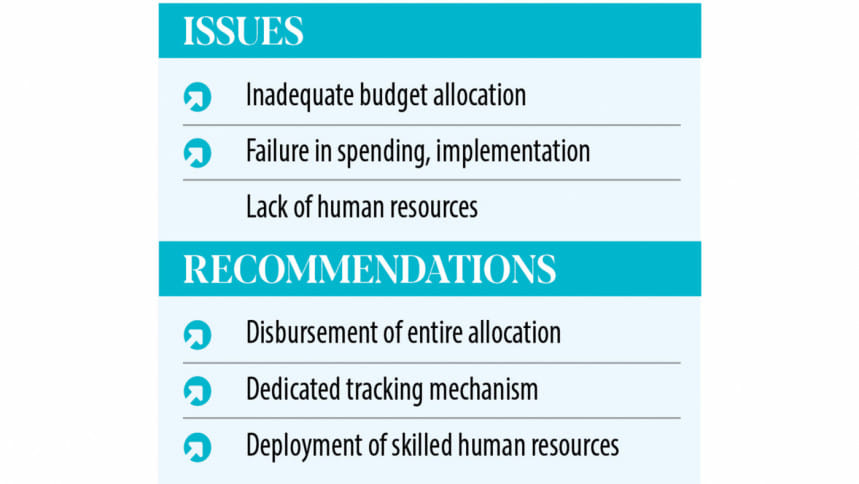Implementation will fall short: study

To achieve the health rights of 3.6 crore adolescents in Bangladesh, the government developed the National Strategy for Adolescent Health and the National Plan of Action to implement it. However, a new study found that the implementation will fall short of addressing the diverse health needs of adolescents.
As per the study conducted by Aparajeyo Bangladesh -- with financial support from Plan International Bangladesh -- the implementation cost of the plan, which was formulated and approved in 2018, is estimated to be around Tk 2,812.7 crore, which is only 0.9 percent of the total health budget for the 2021-2022 fiscal year.
Of the seven implementing ministries, the health ministry is supposed to get the lion's share (94.3 percent) of the allocation, whereas the social welfare ministry will get only 0.01 percent, according to the plan.
The Ministry of Women and Child Affairs will be given 4.29 percent, the education ministry 1.21 percent, the information ministry 0.01 percent, the disaster management ministry 0.19 percent, and the law ministry will be provided 0.04 percent of the total allocation.
What is more surprising is that as per the requirements, 80 percent of the budget is allocated for only three categories of activities -- including training (32 percent), workshops, seminars and conferences (30 percent), and advertising and publicity (18 percent) -- which is inadequate to address the health rights of a large number of adolescents, the study stated.
The study also revealed that only 5 percent of the allocation has been kept for vaccination and other medical needs.
The study, titled "Annual Analysis of Budget Allocated for the National Plan of Action of the National Strategy for Adolescent Health 2017-2030", also revealed that the implementation of the budget is a significant challenge.
An equal amount of the allocation is being disbursed every fiscal year. In the last fiscal year, only over one-third of the total disbursed allocation remained unspent.
For example, it was revealed that the Directorate General of Family Planning (DGFP) had to deal with adolescent-friendly health services, reproductive health medication, sanitary pads, website maintenance, newsletter publishing, training for service providers, and workshops for adolescents from 2017 to 2023.
However, it was unable to effectively implement these initiatives.
More specifically, DGFP was able to achieve only 31.8 percent of its goal of distributing sanitary pads despite using 69 percent of the allotted time.
The study also found that the dearth of adequate human resources is a critical constraint towards the achievement of the targets set by the plan, and the adolescent-friendly health corners in all regions are yet to be functional.
The study recommended that the plan requires official disbursement of the entire allocation at the soonest for smooth and timely implementation, and a dedicated tracking mechanism is also needed in this regard. It also recommended that there must be an emphasis on transgender adolescents, awareness of sexually transmitted infections (STI), and deployment of skilled human resources.
Wahida Banu, executive director of Aparajeyo Bangladesh, urged the government to implement the budgetary allocation properly to achieve the targets and highlighted the appointment of adolescent health counsellors in every school.
"We have to educate both parents and teachers on sexual and reproductive health and rights of adolescents. Teachers must provide comprehensive instruction on SRHR [Sexual and Reproductive Health and Rights] topics, which are often skipped by them," she told this correspondent.

 For all latest news, follow The Daily Star's Google News channel.
For all latest news, follow The Daily Star's Google News channel. 




Comments